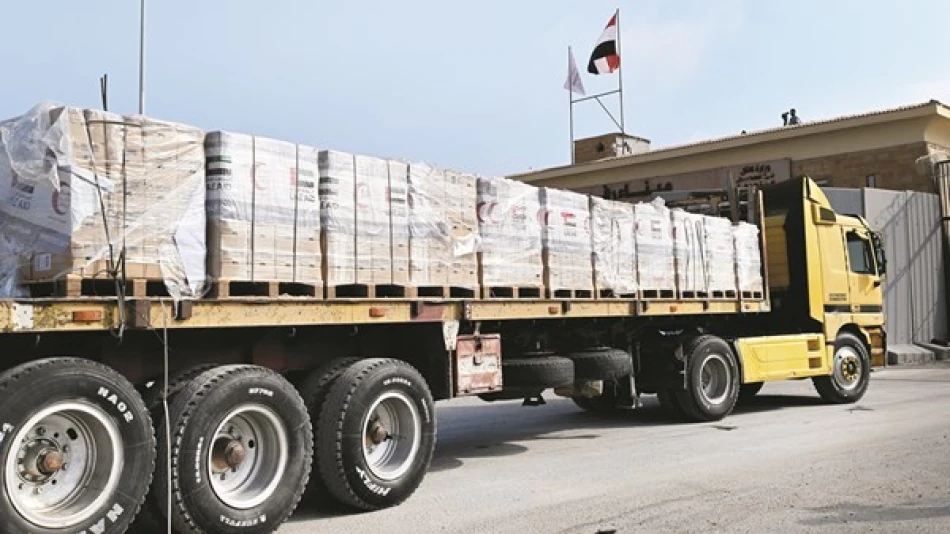
UAE Extends Humanitarian Aid to Gaza Amid Ongoing Crisis
UAE Emerges as Gaza's Lifeline with $1.5 Billion in Aid Despite Unprecedented Blockade
The United Arab Emirates has positioned itself as the world's largest donor to Gaza, delivering over 78,000 tons of emergency supplies and providing $1.5 billion in humanitarian support since the crisis escalated in October 2023. Through innovative delivery methods including airdrops, field hospitals, and desalination plants, the UAE has created a comprehensive humanitarian infrastructure that serves as a critical lifeline for Palestinians amid an unprecedented blockade.
UAE Leads Global Response with Multifaceted Strategy
According to the UN Office for the Coordination of Humanitarian Affairs (OCHA) financial tracking service, the UAE has topped the list of countries providing support to Gaza. This leadership position reflects not just financial commitment but strategic innovation in humanitarian delivery under extreme constraints.
The Emirates' approach combines immediate relief with long-term infrastructure solutions. The country has established six desalination plants producing two million gallons of clean water daily, directly addressing one of Gaza's most critical shortages. Additionally, 30 automated and manual bakeries operate alongside 30 community bakeries and charitable kitchens, providing daily hot meals to approximately 100,000 people.
Medical Evacuation and Treatment Program
Perhaps most significantly, the UAE has evacuated 2,630 patients and injured individuals, including cancer patients, through 25 medical flights. This medical diplomacy represents a direct intervention that has saved lives while demonstrating the country's capacity to navigate complex political and logistical challenges.
UAE field hospitals in Rafah and aboard a floating hospital in Egypt's Al-Arish have provided over 72,000 medical services to Gaza residents, creating a parallel healthcare system when local infrastructure collapsed.
Innovative Delivery Methods Break Through Blockade
The UAE's "Noble Knight" and "Birds of Goodness" initiatives have pioneered airdrop operations that other countries, including Egypt and Jordan, have subsequently adopted. These operations represent a significant evolution in humanitarian delivery, circumventing traditional ground-based supply chains that have proven vulnerable to military action.
Ahmed Hosni, spokesperson for Fatah movement in Gaza, noted that UAE assistance represents approximately half of all international aid reaching Gaza. This proportion underscores both the scale of UAE commitment and the relative shortfall from other international donors.
Preventive Health Measures
The UAE has executed a comprehensive polio vaccination campaign reaching over 640,000 children, addressing long-term public health risks that extend beyond immediate conflict-related needs. This preventive approach demonstrates sophisticated humanitarian planning that considers post-conflict recovery.
Strategic Implications for Regional Diplomacy
The UAE's humanitarian leadership in Gaza reflects broader strategic positioning in Middle Eastern diplomacy. Unlike traditional aid approaches that often face political obstacles, the Emirates has leveraged its diplomatic relationships to maintain consistent supply lines since November 2023.
Habes Al-Sharuf, director of the Palestinian National Security Research Center, emphasized that UAE operations have established "a prominent model for continuous support" that other nations are studying and replicating.
Operational Challenges and Innovation
Despite successes, experts acknowledge significant logistical challenges. Airdrops sometimes fall in combat zones or at sea, making recovery difficult for intended recipients. These operational realities are driving continued innovation in delivery methods and coordination with international partners.
The UAE's comprehensive approach—combining immediate relief, medical intervention, infrastructure development, and preventive health measures—represents a new model for humanitarian response in conflict zones. This integrated strategy may influence how international aid organizations approach future crises where traditional delivery methods prove inadequate.
Setting New Standards for Crisis Response
The Emirates' Gaza operations demonstrate how middle powers can lead international humanitarian efforts through innovation, financial commitment, and diplomatic flexibility. By creating parallel infrastructure systems and pioneering new delivery methods, the UAE has established operational templates that extend far beyond this specific crisis.
This humanitarian leadership reinforces the UAE's broader regional strategy of positioning itself as a stable, reliable partner capable of delivering results in complex geopolitical environments. The scale and consistency of Gaza operations provide concrete evidence of this capacity to both regional allies and international partners.
Most Viewed News

 Layla Al Mansoori
Layla Al Mansoori






